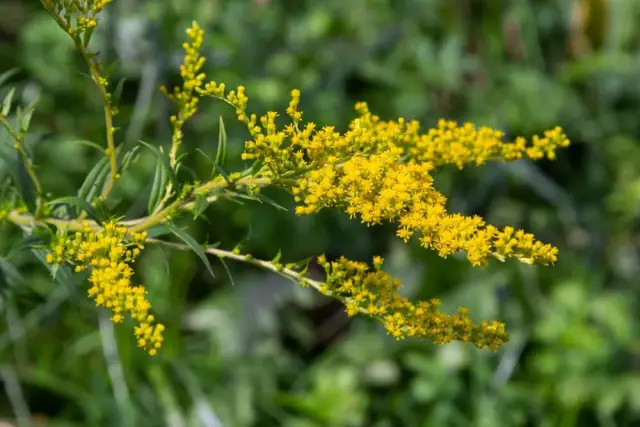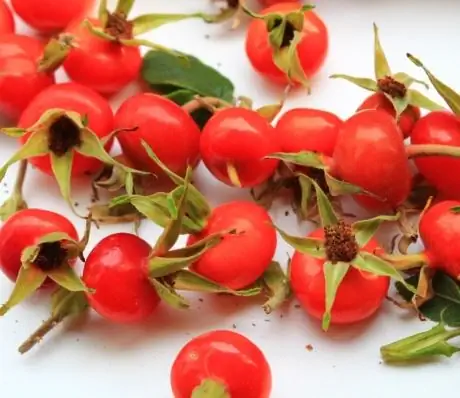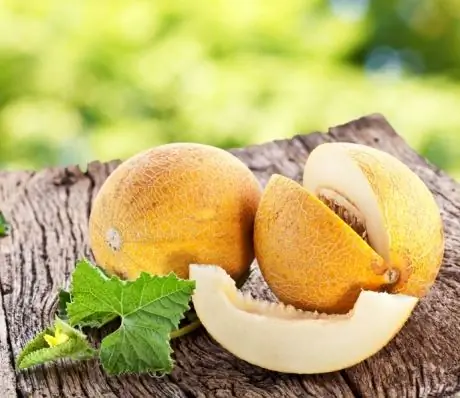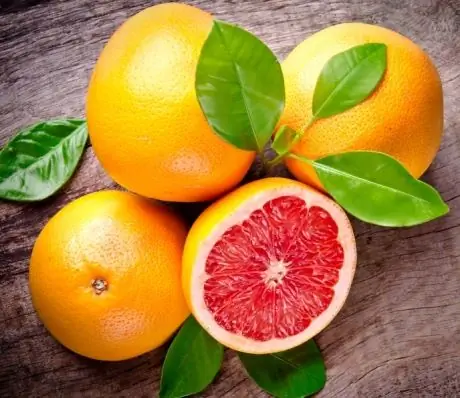- Author Rachel Wainwright [email protected].
- Public 2023-12-15 07:39.
- Last modified 2025-11-02 20:14.
Common goldenrod
Instructions for use:
- 1. Chemical composition
- 2. Useful properties
- 3. Indications for use
- 4. Contraindications
- 5. Home remedies

Common goldenrod is a perennial herb of the genus Goldenrod of the Astrov family, preparations from the herb of which have a pronounced diuretic, antimicrobial and anti-inflammatory effect.
Chemical composition
The composition of the herb of common goldenrod (life-giving herb, spool, golden rod, golden-thousandth grass, scrofula, scrofula, reddish, seven-meter, core, mother of bread, life-giving herb) includes the following biologically active substances:
- organic acids (quinic, etc.);
- diterpenoids;
- triterpenoids;
- saponins (virgauresaponins);
- phytoecdysones;
- phenolcarboxylic acids and their derivatives (caffeic, chlorogenic, hydroxycinnamic);
- phenolic and polyacetylene compounds;
- coumarins (esculin, esculetin);
- flavonoids (narcissin, isorhamnetin, rutin, quercitrin, quercetin, isoquercitrin, astragalin, kaempferol).
Other substances contained in the golden rod:
- inflorescences: carbohydrates and related compounds (polysaccharides, including arabinose, galactose, xylose, glucose, rhamnose);
- fruits: fatty oil.
Beneficial features
The plant is used in traditional medicine as well as in homeopathy. Pharmacy name - Solidaginis herba (golden rod herb).
For medicinal purposes, leafy upper parts of the stems with inflorescences are used, the harvesting of which occurs during flowering. The herb has a mild aroma and a spicy, bitter-astringent taste.
Common goldenrod has a pronounced diuretic, anti-inflammatory and antimicrobial effect. Due to these properties, the plant is widely used in the treatment of chronic diseases of the bladder and kidneys, especially often - with urolithiasis, urinary disorders in the elderly (urinary retention / involuntary urination), albuminuria, hematuria, prostatic hypertrophy.
As a result of experimental studies of the flavonoid complex of the plant, its pronounced diuretic and hypoazotemic properties were revealed. The broth of goldenrod does not possess stone-dissolving properties, but increases the secretory-excretory function of the kidneys, affects the acid-base balance and water-salt metabolism. At the same time, an increase in phosphaturia and an increase in urine pH are observed, at the same time, oxalaturia and uraturia are reduced / eliminated. Thus, common goldenrod can be prescribed for pi therapy and for prophylactic purposes with oxalate and urate stones in the kidneys.
In the British Herbal Pharmacopoeia, the herb of the golden rod is included as an antiseptic and diaphoretic. In Germany, the plant is widely used in the treatment of inflammatory urological diseases, in combination with other plants - for venous diseases.
In folk medicine, water preparations (decoctions / infusions) from the aerial part of the plant are used as an astringent, diuretic, expectorant, diaphoretic, hemostatic, anti-inflammatory, antiseptic, wound healing agent in the treatment of various diseases, including diabetes mellitus, pulmonary tuberculosis, acute respiratory diseases, rheumatism, gout, arthritis, diarrhea, enteritis, colitis, menorrhagia, leucorrhoea, prostatic hypertrophy, acute laryngitis, sore throat, eczema, bladder and kidney diseases, ascites, cholelithiasis, bronchial asthma. Goldenrod extract is recommended for cerebral edema. In Belarus, the plant is used for skin tuberculosis, in the Caucasus, in Siberia and Komi - for scrofula. In the Caucasus, alcoholic tincture from the underground part of the plant is also used as a wound-healing agent.
The inflorescences of the golden rod are used as a powder in folk medicine as a wound healing agent. In Komi and Siberia, they are prescribed (in the form of a decoction) for hepatitis and ulcerative cystitis, in Moldova and Belarus (externally mixed with cream, butter or pork fat) - for rheumatism, skin tuberculosis, burns, dermatitis, leucorrhoea.
In combination with other plants, goldenrod is used for impotence, prostate adenoma, chronic prostatitis and frequent emissions; externally - with eczema and acute laryngitis.
Infusions from the golden rod are prescribed in folk medicine in Bulgaria as a remedy for chronic kidney diseases, including inflammation, stones and sand in the kidneys, albumin in the urine; as a diuretic - for rheumatism, uric acid metabolism disorders, edema and gout. Gruel made from fresh leaves is used externally for the treatment of purulent wounds and boils. For the same purpose, a powder from dry leaves, mixed with a small quality of water, can be used.
Goldenrod seeds in traditional Chinese medicine are used to thin the blood and to treat bloating. Also seeds are used for cholera, wounds, diarrhea, menstrual irregularities.
In Tibet, the aerial part of goldenrod is used in the treatment of neurasthenia and jaundice.
The golden rod is part of various complex medicines - Antiprostin, Prostaforton, Inkonturin, Prostamed, Prostanorm, Fitolizin, Saburgen and others.
The essence of inflorescences in homeopathy is used for the treatment of nephritis, bronchial asthma, arthritis, diathesis, and skin diseases.
Indications for use
Goldenrod preparations are used as a diuretic, antimicrobial and anti-inflammatory agent in the treatment of the following diseases:
- gout;
- rheumatism;
- dropsy;
- gallstone and urolithiasis;
- albuminuria;
- hematuria;
- hypertrophy of the prostate;
- angina;
- gingivitis;
- bronchial asthma;
- tuberculosis;
- purulent wounds, boils.
Contraindications
- acute / chronic glomerulonephritis;
- pregnancy;
- individual intolerance to biologically active substances that make up the plant.
It must be borne in mind that common goldenrod contains toxic substances, therefore, the prescribed dosage of its preparations must be strictly observed.
Home remedies for common goldenrod
- infusion (general recipe): 1 tbsp. l. raw materials for 500 ml of boiling water; infusion time - throughout the night in a thermos; method of application - 3 times a day, 30 minutes before meals, 2/3 cup;
- infusion (therapy of gastritis, stomach pain, urolithiasis, prostate adenoma): 1 tbsp. l. raw materials for 200 ml of cooled boiled water; infusion time - 4 hours; method of application - 3-4 times a day before meals, 1/4 cup;
- decoction (nephritis therapy, to dissolve stones in the bladder and kidneys): 2 tbsp. l. raw materials for 500 ml of water; cooking method - boil for 10 minutes over low heat, then infuse for 1 hour; method of application - 4 times a day, 30 minutes before meals, 100 ml;
- decoction (therapy of sore throat, sore throat, bleeding gums; used for rinsing, has anti-inflammatory and expectorant properties, helps to reduce the formation of phlegm): 3 tbsp. l. raw materials for 200 ml of boiling water; cooking method - heat in a water bath for 20 minutes, cool for 10 minutes; method of application - rinse with warm broth 3 times a day after meals for 1/2 cup;
- tincture (external therapy of fractures, skin diseases, purulent ulcers): 6 tbsp. l. raw materials for 0.5 liters of vodka; method of preparation - insist, shaking daily, for 30 days in a dark place: method of application - in the form of lotions.

Maria Kulkes Medical journalist About the author
Education: First Moscow State Medical University named after I. M. Sechenov, specialty "General Medicine".
Information about the drug is generalized, provided for informational purposes only and does not replace the official instructions. Self-medication is hazardous to health!






